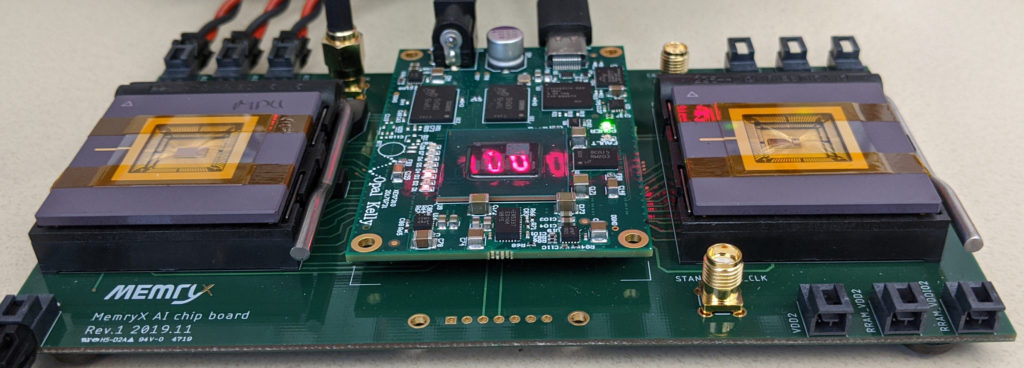
Michigan startup MemryX, Inc. promises faster, cheaper AI processing
The ECE startup builds neuromorphic computer chips uniquely suitable for AI applications

The ECE startup builds neuromorphic computer chips uniquely suitable for AI applications

University of Michigan ECE startup MemryX, Inc. is developing a programmable AI accelerator chip that promises unmatched performance at relatively low power for high-performance applications, including autonomous driving, smart cameras for robots, smart manufacturing, and smart retail.
Our devices are cheap and powerful, but not power hungry.
Wei Lu, Co-founder and CEO, MemryX
While their technology is scalable for use in large data centers, the company is currently focusing on edge computing applications where speed, power, cost and security are paramount. And their technology could save a company thousands of dollars per chip.
“Our devices are cheap and powerful, but not power hungry,” said Wei Lu, company co-founder, CEO, and professor of Electrical Engineering and Computer Science.
The company’s devices are specifically targeted at running neural networks, which drive AI.
“Neural networks are a disruptive technology used everywhere,” said Mohammed Zidan, senior director of architecture at MemryX. “However, classical architectures are not designed for this type of application.”
Much of traditional computer processing is done in either the central processing unit (CPU) or graphics processing unit (GPU). CPUs are general purpose processors, making them suitable for a variety of neural networks, but they tend to be very slow, offering low efficiency.
GPUs, used by gamers, have thousands of cores that run in parallel, which theoretically greatly improves the speed of a machine learning algorithm. However, they not only require high power (up to hundreds of watts), there is a very high energy and latency price to pay to utilize all of the cores in parallel which makes them better suited to cloud applications than edge applications, and, says Lu, they are extremely expensive, with a single high-end GPU designed for AI running about $10K.
Even at that price, GPUs are not offering the performance companies want for their applications, and so companies like Google, Facebook, and Amazon have resorted to designing their own special-purpose chips.

MemryX offers a new solution with their patent-protected memory processing unit (MPU). This technology offers high-performance with low latency and low power, making it ideally suitable for edge computing. It is also capable of supporting many different machine learning models, or neural networks, making it a programmable chip.
Edge computing, where processing is handled on-chip in close proximity to the application instead of being sent to the cloud, offers significant advantages in terms of speed and security.
For example, you want your self-driving car to process incoming data in time to avoid an accident. You also want sensitive medical data that is being collected through sensors to process the data in real-time on site.
MemryX’s technology is ideally suited for anything that includes an intelligent robot, including those used in industrial and hospital settings.
The team
MemryX is founded on the complementary expertise of Lu and Zhengya Zhang, co-founder and associate professor of Electrical Engineering and Computer Science. Lu, who is also co-founder of Crossbar, Inc., brings expertise in neuromorphic computing and in-memory computing systems. Zhang brings expertise in VLSI circuits and systems for computing, communications and signal processing.
Each and every member of our team in the company is amazing.
Mohammed Zidan, Senior Director of Architecture Engineering
Leading the architecture and circuit design teams at MemryX are Lu’s former postdoctoral researcher, Mohammed Zidan, and Zhang’s former doctoral student, Chester Liu, respectively. Liu is senior director of engineering.
“Each and every member of our team in the company is amazing,” said Zidan. “At this point, all the members of my team were products of the University of Michigan.”
MemryX has about 25 employees, and is in the process of doubling that number. Opportunities are open to those with bachelor’s, master’s, and doctoral degrees.
The company
MemryX officially launched in 2019, when they received their first seed funding. Within seven months, they had their first chip – a process that would normally take more like 1.5 years. They presented their first chip at CES in January 2020, and are currently working on the third generation. Several companies are testing out the chip right now.
MemryX is collaborating with Taiwan Semiconductor Manufacturing Co. (TSMC), which is among the world’s largest chip makers and offers advanced fabrication technology. The company is based in Ann Arbor, MI, with a second office in Taiwan. They recently announced the closing of Series A funding and the addition of Rick Wallace (President and CEO, KLA) to the Board of Directors, and Dr. Peter Hsieh (VP of Innovation & Investment, ARM) to the Technical Advisory Board.